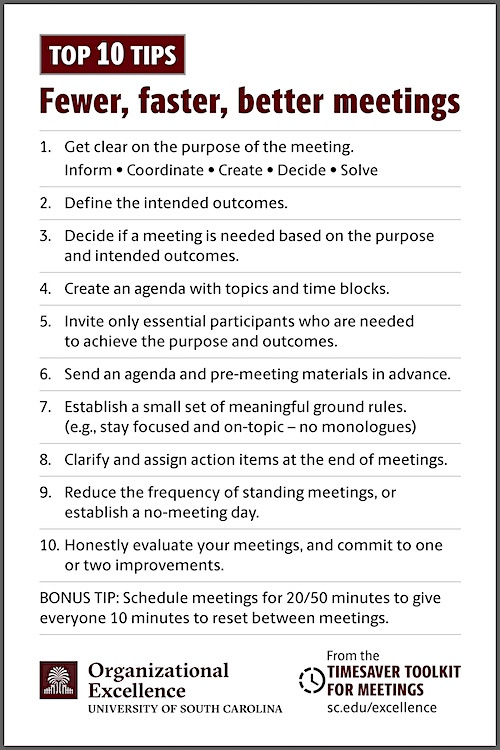| Newsletter: September 2025 |
The third year of the Improvement Leader Program gets underway next week, and we have another excellent group of improvement leaders representing areas across campus.
- The cohort of 16 improvement change agents will spend the next six months learning together. Each participant will gain a core tool set for improvement and facilitate a project in their department.
The Office of the Controller and the Office of Sponsored Awards Management have teamed up on the Grant Proposal, Award, and Account Setup Process Improvement Project to prepare the university for the launch of a new grants management system.
- The project focused first on streamlining and strengthening the process — eliminating redundant steps, saving time, and improving communication and support — so that when the new system goes live, it delivers greater efficiency and transparency.
Why it matters: These improvements will make it easier for faculty and staff to navigate the grants process and better position the university to support the growing volume and complexity of awards..
What's next: The project team has finalized its list of recommended improvements and will present them to project sponsors and stakeholders at the end of September
The Graduate School is moving to a new enrollment management system, Element1801, making applying to graduate programs and tracking student progression faster and simpler for students, faculty, and staff.
Why it matters: The change, which follows a project to study the graduate admissions process and gather broad input from the graduate education community, will give faculty and staff better tools to track progress and support students from application through graduation.
What's next: The first phase launches in spring 2026, with additional phases to follow.
An improvement project team is streamlining the Board of Trustees-approved tenure and promotion notification process.
- The team is focused on the steps from presidential review through Board Office distribution of notifications.
- The project aims to cut preparation time, improve accuracy, and reduce duplicate communications to university leaders.
| Newsletter: April 2025 |
Fifteen more campus change agents have completed the Improvement Leader Program.
Their improvement projects have been posted to the Organizational Excellence website.
- View the presentation slides and recordings to see how these projects drive positive change and meaningful results.
Context: Each participant in the Improvement Leader Program develops an improvement project in their area. It's a hands-on way to build skills and achieve real impact.
Looking ahead: The next round of the Improvement Leader Program begins this fall, and applications open in June. Stay tuned for details.
The Division of Information Technology has taken a major step toward improving how IT purchases are planned and coordinated across the USC system.
A new searchable contracts database debuted in March. Built in-house, it brings together self-reported data from units across the system, making it easier than ever to locate and leverage existing IT contracts.
The bottom line: The overall aim is to ensure collaboration, consultation and coordination well before the point of a purchase request.
What's next: A new workflow is scheduled for rollout in August 2025.
- Integrated into a user-friendly portal, it will guide people through every step of the IT purchasing process — connecting them with IT and purchasing expertise and helping them explore available options, check existing contracts and align with key requirements.
An improvement project team has cut the parking ticket appeal wait time by 95% – from up to five months down to just a few days.
- Parking and Transportation and Student Government co-sponsored a project to improve the appeal process, which was struggling to keep pace with the university’s growth and customer expectations.
- When fully implemented, changes will reduce process time, ensure fairness and improve sustainability, making the process adaptable to future growth.
Building on the work of the Quality of Teaching Committee, the Center for Teaching Excellence is developing an educational module for new faculty.
- This module supports Provost Donna Arnett's goal of advancing teaching excellence and student success.
- The committee, which was supported by the Office of Organizational Excellence, was established in May 2024 and delivered its final report in December 2024.
In a new online resource, we’ve compiled practical tips to help you efficiently and effectively collect valuable feedback from your stakeholders.
Why it matters: The voices of the people directly involved are crucial for driving improvement in any project or process.
- Listening to your customers and other stakeholders reveals important insights about their experiences and priorities.
- Their input helps you pinpoint changes that will create significant and lasting impact.
Read the advice at our website to ensure your feedback process is focused, efficient and leads to meaningful action.
| Newsletter: January 2025 |
With the new year now here, it’s a great time to explore opportunities for improvement in your work area.
If you’re considering an improvement project but aren’t sure where to start, we’re here to help. We can guide you in defining the problem, reviewing data, and evaluating options to determine the best course of action for your situation.
Two new improvement projects are in motion, and two others are nearing completion.
NEW: Pre-Award Grants Process: A team of staff from the Controller's Office, Sponsored Awards Management, and grants management partners from various colleges/schools, will refine the process to strengthen service, increase understanding, and reduce errors.
NEW: Student-Athlete Eligibility Certification Process: A project team involving Athletics, the Registrar, and Academic Advising is working to make the process easier, faster, and better for everyone.
Learn more about these and other projects at this comprehensive projects page.
UPDATE: Parking Ticket Appeal Process: Parking and Transportation Services is working to shorten the parking ticket appeal process time while ensuring the fairness, equity, and sustainability of the process. The project team met in the fall to analyze the current process and generate ideas for improvement. Now they're finalizing a prioritized action plan before beginning to implement it later this semester.
UPDATE Quality of Teaching: The Office of Organizational Excellence supported the Quality of Teaching Committee, established by Provost Donna Arnett in May 2024 to define and promote high-quality teaching at USC. Findings and recommendations from the committee’s December 2024 report will be shared to advance teaching excellence and student success.
When people meet in groups to get things done, success depends on how well they collaborate. That’s where facilitation comes in.
Why it matters: Facilitation is about guiding a group to work effectively. It's about keeping discussions
focused, encouraging participation, and achieving results.
Putting it to work: A full set of facilitation tools is now at your fingertips – tools to analyze problems, generate ideas, make decisions,
organize tasks, and more.
- To keep a group focused and productive, get clear on what you're aiming to accomplish. Then select the tool that can best serve your purpose.
- Here's one example: Use the impact/effort grid to think through possible actions and zero in on the most promising priorities.
- The facilitation toolkit includes 21 tools and techniques in all.
| Newsletter: September 2024 |
If your area wants to bring about improvement but you don't have a neatly packaged project ready to go, no worries. We can help you define the problem, review data, and evaluate options.
- We’ll offer advice and support tailored to your situation.
- The aim is to help you determine the best course of action.
Reach out to us: Let’s discuss how we can help.
Our services include:
The second year of the Improvement Leader Program is now underway, and we have another excellent group of improvement leaders representing areas across campus.
The cohort of 15 improvement change agents will spend the next six months learning together. Each participant will build a core toolset for improvement and facilitate a project in their department.
Does your team want to work together to solve a problem or address a challenge? With our Improvement Foundations Workshop tailored for work groups or teams, you’ll learn about improvement tools and approaches and begin to work together on an issue that you’ve identified as ripe for improvement.
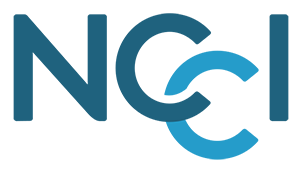 If you’re seeking new insights into change, check out these upcoming learning sessions
from the Network for Change and Continuous Innovation.
If you’re seeking new insights into change, check out these upcoming learning sessions
from the Network for Change and Continuous Innovation.
USC has an institutional membership with NCCI, so you can attend online free of charge.
- The Imperative to Rewiring and Retooling in the Age of AI (September 17, 2-3 p.m.)
- Change Management in Higher Education: Escaping the “We’ve Always Done it this Way” Trap (October 3, 1-2 p.m.)
- Post-Crisis Leadership: Implications for Pursuing Change and Innovation in Higher Education (November 13, 2-3 p.m. )
NCCI focuses entirely on higher education. They promote best practices in continuous improvement, change management and innovation.
To attend, follow these steps to create your free NCCI account. If you already have an account, visit the NCCI webpage to register.
| Newsletter: June 2024 |
The program application is open through July 31
Why it matters: Participants will gain knowledge, skills and experience in improving service delivery and promoting operational excellence, one of the university’s strategic priority areas.
What to expect: Learning sessions will introduce process improvement and resource optimization concepts, facilitation tools and problem-solving methods.
- Participants will apply their knowledge by facilitating an improvement project in their work area.
Next steps: Learn more and apply on the Office of Organizational Excellence website.
- Cohort members will be announced the week of Aug. 5.
What they’re saying: “My favorite part of the project component was that we put what we learned into action.
Participating in the sessions would have been meaningful alone, but applying those
concepts to an actual project was the best and most practical way to ensure the concepts
were understood.”
– Lindsey Cox, Director of Compliance and Tax, Office of the Controller, and Improvement
Leader Program 2023-24 participant
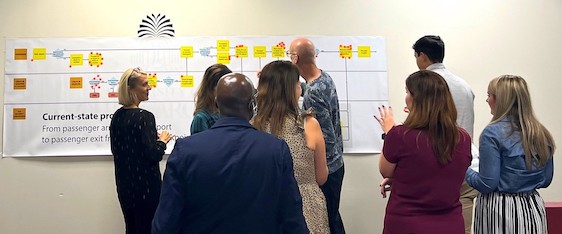
The Student Disability Resource Center and Office of Civil Rights and Title IX teamed up to improve the way students with disabilities request and receive academic accommodations.
 What's new: Staff members are implementing improvements that will have the greatest benefits:
What's new: Staff members are implementing improvements that will have the greatest benefits:
- Updating the application form and exploring integrations with data sources that will auto-fill form fields to increase accurate first-time completed applications.
- Filling vacancies, designating focused application review time and streamlining the way phone calls and appointment schedules are managed to reduce application processing time.
- Sharing information about the center’s services with faculty members and student leaders to enhance support for students with disabilities.
By the numbers: Making these changes will reduce time spent processing applications, giving staff members nearly 800 hours a year to repurpose for higher value work.
Learn more: Visit the website to see the summary action plan, read the report and watch the team's presentation.
University of South Carolina employees can access a wealth of resources and information for free through the university’s institutional membership with the Network for Change and Continuous Innovation.
 NCCI promotes best practices in continuous improvement, change management and innovation
across academic and administrative functions in higher ed.
NCCI promotes best practices in continuous improvement, change management and innovation
across academic and administrative functions in higher ed.
Rich resources: Through NCCI, you'll have access to:
- Recorded webinars featuring successful strategies employed at institutions across the country.
- A members-only resource library packed with articles, templates and tools to help you drive positive change in your work.
Dig in: To create your free NCCI account, follow the instructions on the Organizational Excellence website.
With a “blitz” approach, many improvement projects can be completed more quickly than most people realize.
Some can get done in a single day. For projects that are more complicated but still blitz suitable, the group might have two or three meetings covering up to 12 total hours.
- There are three essential ingredients: a clear and narrow scope, well-defined goals and effective advance work.
Why it matters: Blitz projects can guarantee fast progress, a sense of accomplishment among team members and genuine momentum for change.
The Office of Organizational Excellence can provide guidance from start to finish.
Get started: Contact us to discuss your project.
| Newsletter: March 2024 |
Meetings take up much of our time – which is why they're one of our biggest opportunities to save time.
The key is to take a constructive look at your current meeting situation, then to take a few key actions to achieve real improvement.
![]() You'll find everything you need at the Timesaver Toolkit for Meetings. Included are practical recommendations, tools, sample agendas, and a concise page
of Top 10 Tips. You'll even see a meeting time calculator, so you can run the numbers
on your own meetings
You'll find everything you need at the Timesaver Toolkit for Meetings. Included are practical recommendations, tools, sample agendas, and a concise page
of Top 10 Tips. You'll even see a meeting time calculator, so you can run the numbers
on your own meetings
We've put THE most important meeting tips on a postcard-size card. To get a supply to share with colleagues, fill out this quick form.
 To learn more about meetings at USC, the Office of Organizational Excellence conducted
a survey – and heard from 145 people who average 344 hours in meetings each year.
Among the survey findings:
To learn more about meetings at USC, the Office of Organizational Excellence conducted
a survey – and heard from 145 people who average 344 hours in meetings each year.
Among the survey findings:
- There are way too many meetings just to share information. Reducing these would be an easy and instant time saver.
- Meetings are rarely designed to fit their purpose. By developing a purpose-driven agenda, you'll set up your meetings for success.
- Just about everyone gets frustrated with meeting dominators who talk and talk. A few good ground rules can help.
There are proven practices to help all of us make the best use of meeting time. See the survey report for insights and recommendations.
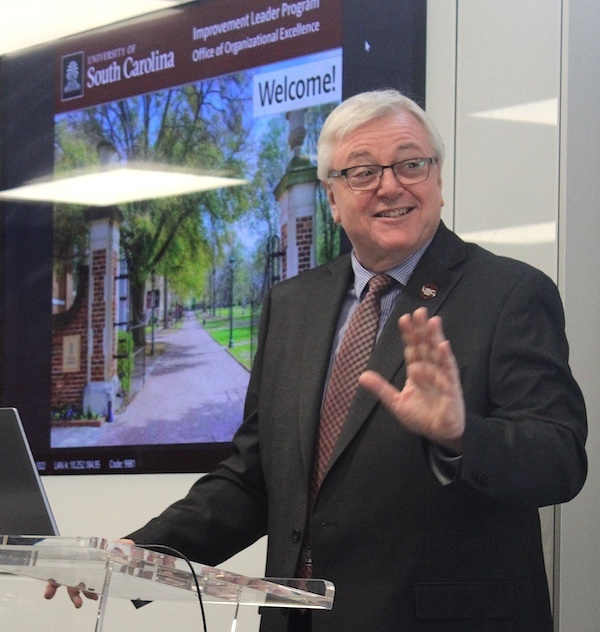 Celebrating Progress
Celebrating Progress
At the concluding session of the 2023-24 Improvement Leader Program, President Amiridis recognized the group for making a difference and influencing positive change at USC.
Each of the improvement leaders facilitated an improvement project. Check out the their slides and recorded presentations to learn more about key improvements, action plans, and results.
| Newsletter: December 2023 |
As 2023 concludes, the Office of Organizational Excellence has evolved from a vision of President Amiridis to a small and mighty unit.
- The office facilitates high-impact, university-wide improvement projects in partnership with university leaders.
- They are expanding our internal improvement capabilities – the office created and launched the USC Improvement Leader Program to embed improvement skills and competencies within units.
- They're also providing strategic alignment and process improvement consultation and guidance to individual units as a neutral, third-party.
This initiative has been powered by strong supporters and partners.
University-wide improvement projects don’t happen because one office is interested in improvement. They happen because leaders see an opportunity and seek positive change. We owe a debt of gratitude to President Amiridis, our Advisory Group, our initial project sponsors (Donna Arnett, Ed Walton, Rex Tolliver, Julian Williams, Venis Manigo, Ann Vail), and all who have served on project teams and project review groups.
We are also thankful for our first cohort of improvement leaders who are taking time to save time. These leaders and their sponsors will feel the return on their investment.
With the support and involvement of so many in 2023, the year concludes with a strong foundation of Organizational Excellence at USC. We look forward to building on that foundation in partnership with you in 2024!
Academic Financial Planning Optimization
 The providers of academic financial planning information from various administrative
units have come together to hear directly from users about their reporting needs,
review existing platforms, and develop a coordinated future state plan for the delivery
of academic financial planning information. The team includes the Budget Office, Provost’s
Office, Bursar’s Office, Controller’s Office, Division of Information Technology,
Human Resources, and Institutional Research, Assessment and Analytics.
The providers of academic financial planning information from various administrative
units have come together to hear directly from users about their reporting needs,
review existing platforms, and develop a coordinated future state plan for the delivery
of academic financial planning information. The team includes the Budget Office, Provost’s
Office, Bursar’s Office, Controller’s Office, Division of Information Technology,
Human Resources, and Institutional Research, Assessment and Analytics.
Status: Initial report and action plan drafted based on user feedback, platform capabilities, and future state vision.
What's next: Incorporate feedback from sponsors and share final action plan with stakeholders.
In the photo below: The academic financial planning optimization team is working together to refine and prioritize their improvement ideas.
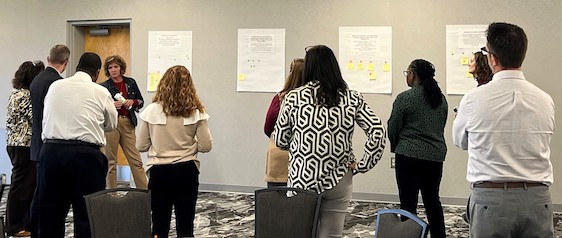
Student Disability Accommodations Process
 The Student Disability Resource Center and Office of Civil Rights and Title IX have
partnered to provide visibility into the student disability accommodations process,
reduce student disability accommodations process time, and ensure a coordinated approach
for graduate students who need both academic and workplace accommodations.
The Student Disability Resource Center and Office of Civil Rights and Title IX have
partnered to provide visibility into the student disability accommodations process,
reduce student disability accommodations process time, and ensure a coordinated approach
for graduate students who need both academic and workplace accommodations.
Status: Initial action items drafted based on process mapping and stakeholder survey responses.
What's next: Refining action items for review by sponsors.
Graduate Student Application Process
 The Graduate School is reviewing its application process to provide clarity and visibility
to students, faculty, and staff; improve the application process time; and reduce
duplication and ensure a coordinated process.
The Graduate School is reviewing its application process to provide clarity and visibility
to students, faculty, and staff; improve the application process time; and reduce
duplication and ensure a coordinated process.
Status: Initial process mapping and improvement idea generation conducted by the Graduate School team (internal review).
What's next: Hearing from stakeholders via a survey to inform improvement ideas (stakeholder feedback).
Click on either or both of the following links for a quick slide-show overview of resource optimization projects and process improvement projects.
Improvement leaders have completed their core content sessions, and their improvement projects are well underway. This first cohort of improvement leaders is moving quickly and setting the bar high!
Each of the 13 people in the cohort is guiding a project – with a broad reach across the university and significant impact on a wide range of stakeholders.
- 7 are process improvement projects to streamline processes, save time, and improve the experiences of students, faculty, and staff.
- 6 are resource optimization projects to align efforts toward common outcomes and make the best use of faculty and staff time.
What's the impact: Some of the projects are focused on individual academic units, and the project discoveries and plans will be relevant to and useful for academic units across the university. Similarly, projects focused within administrative areas will facilitate better service to students, faculty, and staff throughout USC and will reduce time spent on low-value activities.
When to expect results: The last improvement leader session is scheduled for February 2024. Many of the projects will conclude by that time, and others will be completed soon after. Action plans and improvement results will be shared, with details and links in the March newsletter.
During their learning sessions, participants engaged in an in-depth simulation for hands-on experience with process improvement. In the photos below, they're studying a process to find occurrences of process waste.
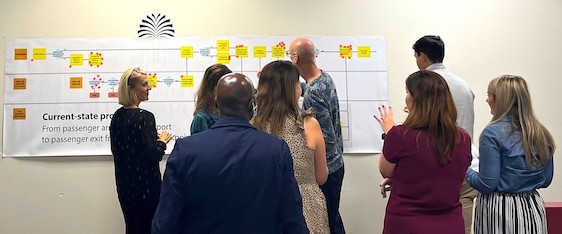
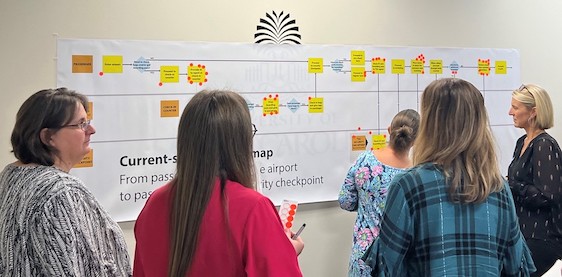
| Newsletter: September 2023 |
USC's Improvement Leader Program is underway. The 2023-24 cohort had its first session in early September, with participants from 3 colleges, 5 administrative units, 3 student services units, and the Alumni Association.
Focusing on results: As the sessions unfold, each participant will build a core toolset for improvement and facilitate a project in their department. With 13 people in the program, this real-project approach will have a tremendous multiplier effect.
Building our capacity: Participants were identified by their units as contributors to positive change. Congratulations to all of them – and to their colleges and divisions!
See who's in the 2023-24 cohort.
Learn more about the program.
The Purchasing Department is implementing its improvement action plan – developed through an improvement project that included customer listening sessions, a survey, process mapping, and close analysis of all the input.
Why it matters: The aim is to improve process times for purchase orders and increase customer satisfaction.
One key point of focus: Loopbacks factored heavily in the findings. These occur when a requisition is submitted with incorrect or missing information, or under the wrong procurement method – and Purchasing needs to "loop back."
Data-driven improvement: This front-end delay can be very time-consuming, so the action plan includes improvements to reduce loopbacks. A targeted reduction from 80% to 50% in one year will free up an estimated 6,300 hours for higher-value work. And because 3 days pass on average for a loopback to be fully resolved, due to the inevitable back-and-forth to get needed information, every eliminated loopback will speed up the process by an average of 3 days.
Project report with background, data, and all improvements
Slides from August 2023 team presentation [pdf]
Video of team presentation video
Want to improve a process but don’t know where to start?
Check out this list of high-potential improvements. It gives you 14 practical recommendations on one concise page. It’s based on a review of 100 improvement projects to pinpoint key changes that had maximum impact in making processes more efficient, effective, and user-friendly.
Subtractive improvement: Most of these high-impact improvements involve subtracting and simplifying – which is perfect because no one has time for extra stuff. Perhaps you can eliminate redundant approvals to reduce hand-offs and rubber stamps. Or provide one clear checklist on the front end to mistake-proof initial inputs.
| Newsletter: June 2023 |
Over the last six months, the Office of Organizational Excellence has evolved from a vision articulated by President Amiridis – to a start-up unit supporting efficiency, effectiveness, and outstanding service. Many partners across the university have made this progress possible.
Selected highlights:
- Hired the Organizational Excellence team
- Launched website with tips, tools and resources
- Delivered interactive improvement workshops to 100 people
- Provided organizational excellence overview presentations to 115 stakeholders
- Facilitating two high-impact improvement projects:
- Purchasing process improvement
- Academic financial planning optimization
- Heard from +300 faculty and staff as an essential component of these two projects
- Launching improvement practitioner program in Fall 2023 (see below)
And we’re just getting started!
USC's new Improvement Leader Program blends practical learning with real improvement projects and results.
- The program begins in September and continues through March 2024.
- Applicants submit three potential improvement projects supported by their department.
- Applications are being accepted through August 1, 2023.
The Controller’s Office has recently announced a new process for reimbursing students and non-employees for travel expenses. Implementation is planned for early in the new fiscal year. Student and employee feedback, and data on travel reimbursement process times, made this a priority for the Controller’s Office team. The improvements will shorten the timeline for student and non-employee travel reimbursements and minimize the personal obligation for upfront travel costs.
Now in effect: Colleges and Support Units can take advantage of the Department Travel Card Program to book airfare (for employees, students and non-employees) and pay registration (for employees and students). Reach out to the Travel Team travelcard@sc.edu for details.
Summer 2023: For qualifying expenses that have not already been paid with a Department Travel Card, a new process with automated workflow in Finance PeopleSoft will simplify and speed up reimbursement.
Why it matters: It’s a costly imposition on students to have them pay with personal credit cards for travel to conferences or events, and then to have them wait to be reimbursed. Now, major costs (such as airfare and registration) can be covered by the university on the front end with the department travel card and the timeline for reimbursement of other costs (mileage, per diem, etc.) will be much shorter.
An improvement team from the Purchasing Department has been listening to its customers in a major way. The team held six input sessions and conducted a survey – in order to gather feedback, perspectives, and suggestions directly from the people they serve.
- 6 sessions to gain in-depth input from key customers and stakeholders
- 16 people provided input – including principal investigators and other researchers, administrative directors, business managers, IT managers
- 161 people provided feedback via a survey of requisitioners
Team members studied all the input, discussed it as a group, and uncovered key themes,
common concerns, unexpected insights – then used this information to identify specific
improvements to make the process easier and better for everyone.
The team plans to issue a report summarizing its action set in mid-July. In August,
team members will lead a presentation sharing the action plans and telling the story
of what they did to take improvement to the next level.
Why it matters: Every process has people who need what the process delivers. Customers are supremely
important – they're WHY the process exists. With improvement projects, teams should
reach out and hear directly from a cross-section of their customers – regarding needs,
wants, frustrations, compliments, and suggestions. Kudos to the Purchasing Department
for doing this so thoroughly.
When it comes to improvement, a few measures can make all the difference.
Without them, improvement can be guesswork. With measures, you can better understand the current situation, set realistic numeric goals, and see the degree to which implemented improvements are having an impact.
This tip sheet [pdf] gives you a full set of measures tailored for process improvement. They're in straightforward plain language, they're in four categories, and they're all on one easy page.
There's a lot on that page, but no worries, no one uses all these measures. Most improvement efforts involve a few – with process time (aka lead time), number of loopbacks, and rework rate being among the most common.
- After you check out the Key Measures [pdf] compilation, visit the Resources section for more tip, tools, and templates.
The Advisory Group for Organizational Excellence has quickly become an important force for positive change since its formation in January.
The group has met three times so far – reviewing accomplishments to date, identifying potential improvement projects, ensuring coordination, shaping near-term plans, and maintaining a vision of longer-term possibilities.
They have been active between sessions as well, working with the Office of Organizational Excellence regarding possible projects and other opportunities.
We are fortunate to have their guidance, support, and advocacy.


